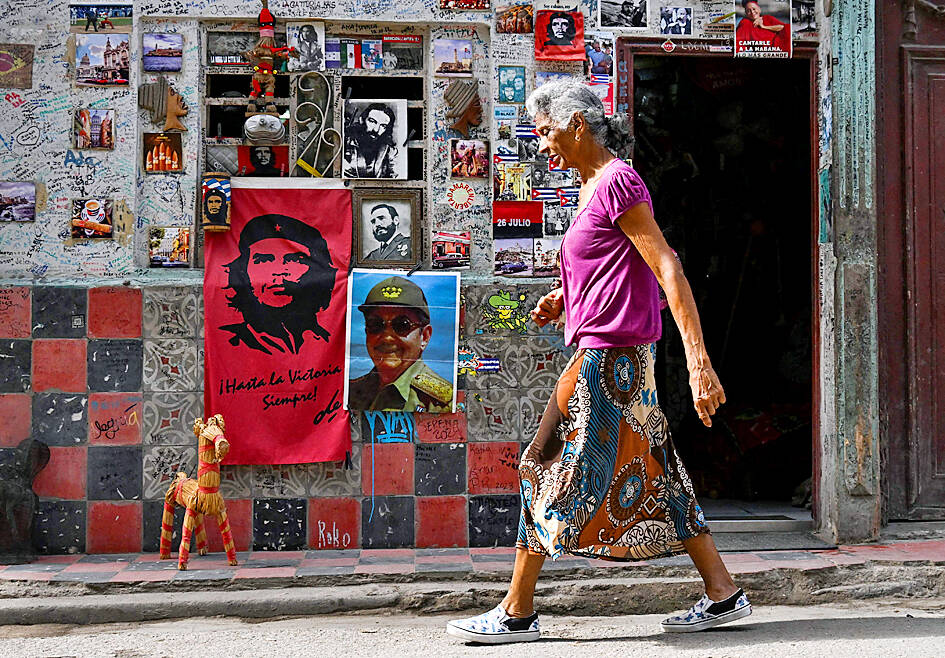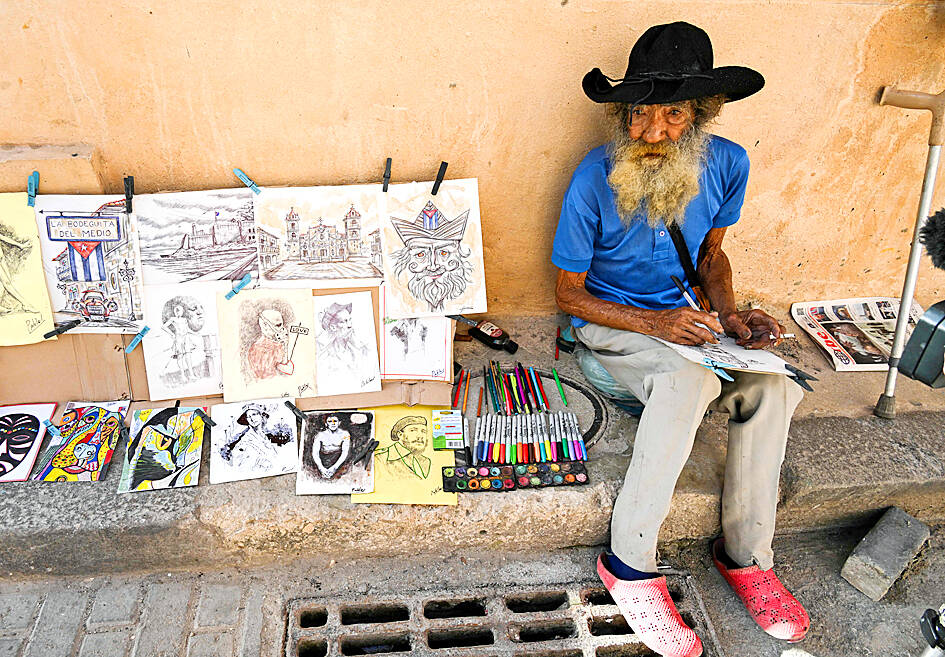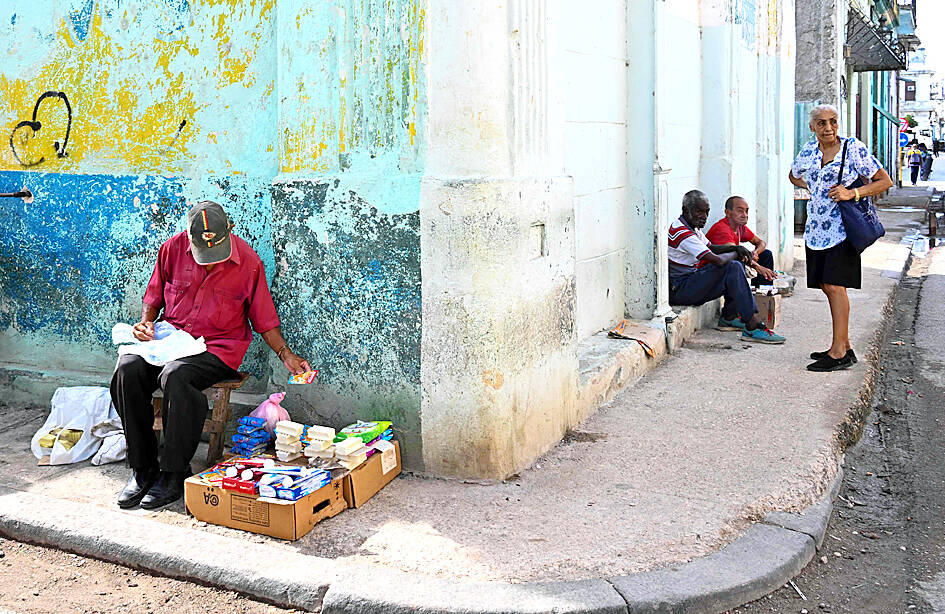With a monthly pension barely sufficient to buy 15 eggs or a small bag of rice, Cuba’s elderly people struggle to make ends meet in one of Latin America’s poorest and fastest-aging countries.
As the communist island battles its deepest economic crisis in three decades, the state is finding it increasingly hard to care for about 2.4 million inhabitants — more than one-quarter of the population — aged 60 and older.
Sixty is the age at which women — for men it is 65 — qualify for the state pension, which starts at 1,528 pesos per month. That is less than US$13 at the official exchange rate and a mere US$4 on the informal street market where most Cubans do their shopping.

Photo: AFP
“Fight for life, for death is certain,” said vendor Isidro Manuet, 73, sitting on a sidewalk in the heart of Havana, his skin battered by years in the sun, several of his front teeth missing.
“I manage to live, survive, nothing more,” he said of his meager income that allows him to buy a little food, and not much else.
As he spoke, Manuet looked on as small groups of people walked by his stall carrying bags full of food. They were coming out of Casalinda, one of several part-government-run megastores that sell goods exclusively to holders of US dollars — a small minority of Cubans.

Photo: AFP
Most rely instead on informal stalls such as the ones Manuet and other elderly Cubans set up on sidewalks every morning to sell fruit, coffee, cigarettes, candy, used clothes and other second-hand goods.
Near Manuet’s stall, 70-year-old Antonia Diez sells clothing and makeup. “Things are bad, really bad,” she said, shaking her head.
Many of Cuba’s elderly have been without family support since 2022, when the biggest migratory exodus in the country’s history began amid a crisis marked by food, fuel and medicine shortages, power blackouts and rampant inflation.

Photo: AFP
More beggars can be seen on Havana’s streets — although there are no official figures — and every now and then an elderly person can be spotted rummaging through garbage bins for something to eat, or sell.
The Cuban crisis, which Havana blames on decades of US sanctions, but analysts say was fueled by government economic mismanagement and tourism tanking due to the COVID-19 pandemic, has affected the public purse too, with cuts in welfare spending.
As a result, the government has struggled to buy enough of the staples it has made available for decades to impoverished Cubans at heavily subsidized prices under the “libreta” ration book system.
Diez said she used to receive an occasional state-sponsored food package, “but it’s been a while since they’ve sent anything.”
Official figures show that about 68,000 Cubans aged 60 and older rely on soup kitchens run by the state Family Assistance System for one warm meal per day.
At one such facility, “Las Margaritas,” a plate of food costs about 13 pesos. Pensioner Eva Suarez, 78, has been going there daily for 18 months.
“The country is in such need. There’s no food, there’s nothing,” she said, adding that her pension is basically worthless “because everything is so expensive.”
Inflation rose by 190 percent between 2018 and 2023, but pensions have not kept pace.
Some are losing faith in communism, brought to the island by Fidel Castro’s revolution, and its unfulfilled promises, such as a liter of subsidized milk for every child aged seven or younger per day.
“I have nothing, my house is falling apart,” said Lucy Perez, a 72-year-old economist who retired with 1,600 pesos a month after a 36-year career.
“The situation is dire. The nation has no future,” she said.
It is not just the elderly encountering hardship.
Cuba was rocked by unprecedented anti-government protests in 2021, and students have been rebelling in recent months due to a steep hike in the cost of mobile Internet — which only arrived on the island seven years ago.

Former Nicaraguan president Violeta Chamorro, who brought peace to Nicaragua after years of war and was the first woman elected president in the Americas, died on Saturday at the age of 95, her family said. Chamorro, who ruled the poor Central American country from 1990 to 1997, “died in peace, surrounded by the affection and love of her children,” said a statement issued by her four children. As president, Chamorro ended a civil war that had raged for much of the 1980s as US-backed rebels known as the “Contras” fought the leftist Sandinista government. That conflict made Nicaragua one of

BOMBARDMENT: Moscow sent more than 440 drones and 32 missiles, Volodymyr Zelenskiy said, in ‘one of the most terrifying strikes’ on the capital in recent months A nighttime Russian missile and drone bombardment of Ukraine killed at least 15 people and injured 116 while they slept in their homes, local officials said yesterday, with the main barrage centering on the capital, Kyiv. Kyiv City Military Administration head Tymur Tkachenko said 14 people were killed and 99 were injured as explosions echoed across the city for hours during the night. The bombardment demolished a nine-story residential building, destroying dozens of apartments. Emergency workers were at the scene to rescue people from under the rubble. Russia flung more than 440 drones and 32 missiles at Ukraine, Ukrainian President Volodymyr Zelenskiy

COMPETITION: The US and Russia make up about 90 percent of the world stockpile and are adding new versions, while China’s nuclear force is steadily rising, SIPRI said Most of the world’s nuclear-armed states continued to modernize their arsenals last year, setting the stage for a new nuclear arms race, the Stockholm International Peace Research Institute (SIPRI) said yesterday. Nuclear powers including the US and Russia — which account for about 90 percent of the world’s stockpile — had spent time last year “upgrading existing weapons and adding newer versions,” researchers said. Since the end of the Cold War, old warheads have generally been dismantled quicker than new ones have been deployed, resulting in a decrease in the overall number of warheads. However, SIPRI said that the trend was likely

‘SHORTSIGHTED’: Using aid as leverage is punitive, would not be regarded well among Pacific Island nations and would further open the door for China, an academic said New Zealand has suspended millions of dollars in budget funding to the Cook Islands, it said yesterday, as the relationship between the two constitutionally linked countries continues to deteriorate amid the island group’s deepening ties with China. A spokesperson for New Zealand Minister of Foreign Affairs Winston Peters said in a statement that New Zealand early this month decided to suspend payment of NZ$18.2 million (US$11 million) in core sector support funding for this year and next year as it “relies on a high trust bilateral relationship.” New Zealand and Australia have become increasingly cautious about China’s growing presence in the Pacific